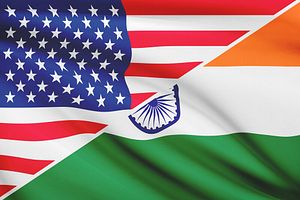The United States and India will meet for their fifth annual Strategic Dialogue on July 31. The dialogue will mark the first significant high-level bilateral diplomatic interaction between the two sides since Narendra Modi and the Bharatiya Janata Party (BJP) came to power in India following a landslide electoral victory. Indian External Affairs Minister Sushma Swaraj will lead the Indian side at the Strategic Dialogue.
U.S. Secretary of State John Kerry, who is scheduled to travel to New Delhi later this week, set the tone for the dialogue in a speech at the Center for American Progress (CAP) in Washington D.C. on Monday. Kerry noted that the Strategic Dialogue could be a “potentially transformative moment” for U.S.-India bilateral relations. Not only will the United States begin forging closer ties with a new Indian government under the BJP, but the dust appears to have finally settled from a scandal involving the arrest of an Indian diplomat in New York last fall which caused a massive rift between the two countries.
In his remarks Monday evening, Kerry specifically emphasized the United States’ interest in working with the Modi government. Kerry praised Modi’s development initiatives, specifically citing Modi’s “Sab ka saath, sab ka vikas” slogan (“Together with all, development for all”). State Department spokesperson Jen Psaki also emphasized the importance the United States is attaching to this week’s Strategic Dialogue with India: “Secretary Kerry’s visit underscores the importance of the U.S.-India partnership, and will lay the groundwork for Prime Minister Modi’s September visit to the United States.” She added that “in addition to holding the Strategic Dialogue, Kerry will meet Modi, the first cabinet level meeting with a U.S. official since the inauguration of the new Indian government.”
Kerry’s visit will set the tone for Modi’s trip to the United States, which will take place later this year. While in New Delhi, Kerry will be focused on setting the strategic partnership between the United States and India back on track following last year’s scandal involving the arrest of Devyani Khobragade, India’s deputy consul in New York. That the scandal managed to affect bilateral ties so deeply exposed just how shallow the U.S.-India partnership had become. Both sides regularly affirm their commitment to similar values and find common rhetoric as democracies, but when it comes to actually deepening cooperation, neither side has picked up the momentum that should have been generated by the watershed civil nuclear cooperation deal of the mid-2000s.
India’s new BJP government is additionally more interested in using every diplomatic avenue at its disposal to foster India’s economic development. Since his election, Modi has demonstrated considerable interest in India’s neighbors China, Japan, and Russia as important partners for India. When in New Delhi this week, Kerry will have paint a convincing picture of why the United States and India “should be indispensable partners for the 21st century.”
Kerry praised what he saw as Modi’s intent to make India a leader in South Asia, referring to his unprecedented decision to invite the region’s leaders to his swearing-in as prime minister in May: “And by inviting leaders from around the region to his swearing-in, and by bringing them together to speak about connecting their economies as one of his first orders of business, he is eager for India to play a leading role. And guess what? So are we.”
Kerry’s CAP speech touched on some points that will likely interest the Modi government. Notably, Kerry spoke enthusiastically about increasing bilateral trade from $100 billion to $500 billion. Additionally, Kerry brought up the U.S.-India Civil Nuclear Agreement as a point worth expanding. The two sides will have to overcome some differences on that count, including India’s controversial nuclear liability law that has rendered its domestic market inhospitable to risk-averse foreign nuclear firms. However, Kerry encouraged both sides to continue to tackle their differences directly.
The U.S. delegation to this year’s Strategic Dialogue includes a variety of high-level U.S. officials. Kerry will be accompanied by U.S. Secretary of Commerce Penny Pritzker, who will head economic talks between the two sides. Additionally, according to The Hindu, Deputy Secretary of Energy Daniel Poneman, Department of Homeland Security Under Secretary Francis Taylor, and NASA Associate Administrator Michael O’Brien will all head to New Delhi.
Overall, this year’s Strategic Dialogue represents an important opportunity for both sides to reinvigorate the bilateral relationship after a series of unfortunate setbacks. With a new and dynamic government in New Delhi, the time has never been better for the U.S. and India to build momentum and increase cooperation regionally and globally.

































